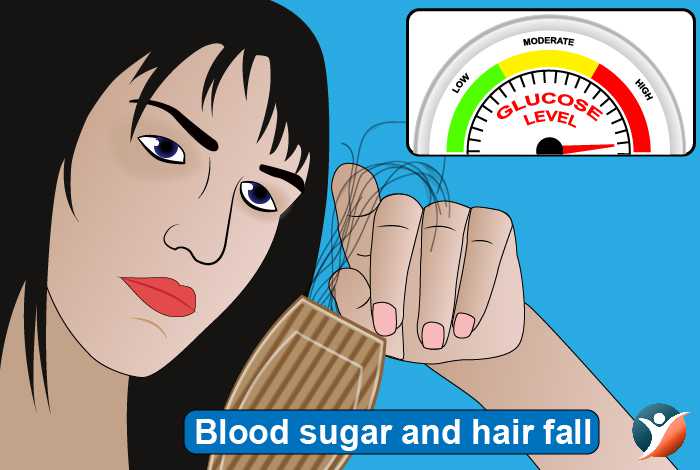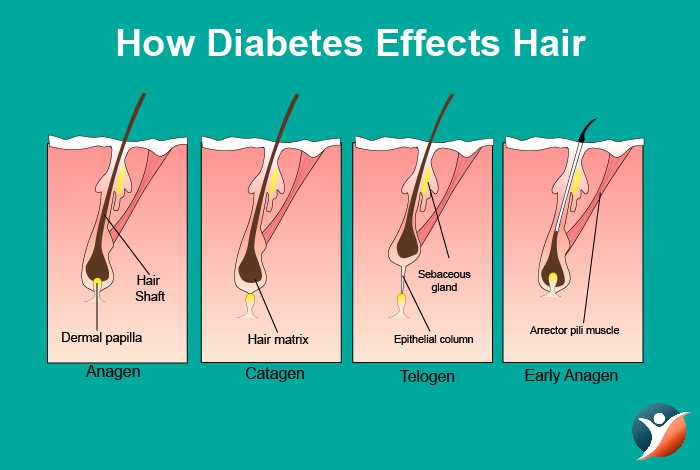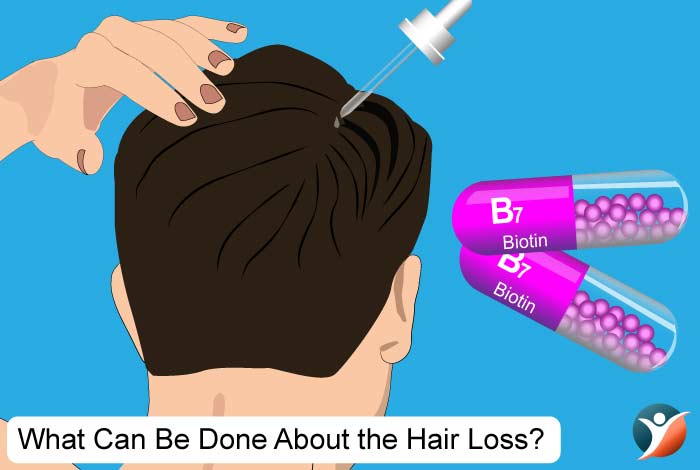
Diabetes and Hair Fall – is There a Relation?

Is there any connection between diabetes and hair loss? Yes it is. Diabetes is the curse of the modern society crippled with stress, sedentary lifestyle, fast food and worries. So, there is a connection between this disease and fragile hair, balding and complicated locks. People in this group are more susceptible to nerve damage and damage to other blood vessels and body organs.
If you are a diabetic, you won’t be able to produce insulin or your body would be unable to use it effectively. Insulin is a hormone, which transports sugar from the blood to the cells to be utilized as energy. When either insulin is insufficiently produced or is not used effectively, the sugar remains in the blood.
This extra sugar can be damaging to various body organs like the eyes, kidneys, nerves and so on. It can even damage blood vessels which provide oxygen to the body for nourishment of different tissues and organs. Since the blood vessels are damaged, oxygen may not be delivered to the hair follicles for nourishment. This oxygen lack may affect the normal growth cycle of hair. Thus diabetes can cause hair loss.
Table of Content
How Diabetes Affects Hair Health?
There are three phases that hair goes through. The first is the active growing phase which remains for two or more years. In this stage hair grows at a rate of 1-2 cm each month. The next is the resting phase which remains for three or more months. After that, some of the hair falls out.
Diabetes interferes with this process, slowing down the growth of the hair [1]. When you have diabetes, you may lose more hair than normal. The hair loss is evident not only on the head, but also on the legs, arms and other body parts. Even if at all the hair grows back, the hair growth rate is slower than usual.
People with diabetes have a greater likelihood of having a condition, known as alopecia areata. In alopecia, the hair follicles get attacked by the immune system, resulting in hair loss patches on the head and other body parts too.
Diabetes can cause hair loss. Hair loss may also occur because of stress due to this chronic illness itself or as a side effect of the medicines used to treat diabetes. Thyroid complications that generally come along with diabetes can also lead to hair loss.
In this scenario, less oxygen and nutrients are transported to the upper and lower body extremities like the feet and scalp. Those with diabetes not only experience hair loss, but have slower hair growth. It can even lead to hormonal imbalance in the body, which may be manifested by hair thinning. Hormonal imbalance is also the reason for hair loss after delivery and menopause.

Sometimes, the drugs used to treat diabetes can also make you go bald and if this seems like your case, consult your doctor and get your prescription changed.
This is a dreadful disease, which can weaken the immune system and lead to other conditions like thyroid dysfunction and skin rashes. Diabetes may even cause oxidative stress, which can result in old hair.
You must have noticed changes in the condition of your hair since you have been diagnosed with diabetes. Changes like loss of hair, and altered hair texture or color are common observations in case of diabetes.
Diabetes can cause hair loss and so, if you have diabetes and experiencing hair loss, the very first step you should take is to determine what type of hair loss you are suffering from. It could be that the loss of hair is temporary and nothing more than a response to the strain that untreated diabetes has on the body.
If that’s the case, you are possibly dealing with telogen effluvium or diffuse hair loss. In either case, hair will naturally grow once you have control over your blood glucose levels with medicines or insulin therapy.
There could be other diabetes-related causes of hair loss. Diabetes could affect the circulatory system, making it less functional. Proteins and other nutrients are important for hair growth, so a dip in the amount of these reaching the follicles may result in weaker and slower growth of hair.
A possible solution to this is to take a nutritional supplement without sugar. This will ensure that you are getting sufficient nutrients in case the diet alone is not enough.
If you feel unwell or there are other symptoms in addition to hair loss, you might be having an infection as immune system usually gets affected when the blood has excess sugar content. This may disrupt the hair growth cycle and make the hair get into the resting phase; thereby, giving you weaker hair.
If your diabetes is under control, but you are still losing hair more than normal, it may be that you are having pattern baldness. It is quite possible that hair loss related to diabetes can mark the beginning of pattern hair loss, and what initially begun as temporary baldness can become permanent. [2]
Hair loss is a lesser-known side effect of diabetes. For a few individuals, hair loss begins with the onset of diabetes; for some, it can be a mere sign that they may have diabetes. Thus, it is recommended to speak to a doctor if you are a diabetic and experiencing shedding of hair.
Common Diabetes-Related Factors that Can Lead to Hair Loss
Discussed below are several factors pertaining to diabetes that may cause hair loss:
• Poor Circulation: Damage to blood vessels prevents oxygen and essential nutrients from reaching the extremes, including the hands, feet and scalp. Hair follicles that haven’t been nourished properly may become weak and their grip may loosen from the hair strands, and if this continues, new shafts may not be generated.
• Hormonal Imbalance: Diabetes can interfere with the hormone production of the body. This imbalance affects the hair’s growth cycle. And, for this reason, some women experience hair loss during menopause or pregnancy.
• Weakened Immune System: If stress and other illnesses weaken the immune system, the scalp becomes more prone to diseases. Bacterial and fungal infections can also lead to hair loss.
• Telogen Effluvium/Slow Cell Rejuvenation: Diabetes can delay the regeneration time of body cells and interfere with the normal hair growth cycle. At any given point in time, most of our hair is in the growth phase (anagen) and about 15% of the hair is in the resting phase (telogen).
Environmental factors, illness, stress, hormones can cause a greater percentage of hair to enter the resting phase, resulting in telogen effluvium, a form of hair loss, characterized by hair thinning and shedding.
Can Metformin Lead to Hair Loss?
Metformin or metformin hydrochloride is a medication generally prescribed to type 2 diabetics or people with hyperglycemia (high blood glucose level). It acts by decreasing the sugar production in the liver and increasing sensitivity of muscles towards sugar.
Metformin intake leads to hair loss is a highly debatable topic. Some reports suggest there is an indirect link between metformin intake and hair loss, and that long-term use of this diabetes drug can cause deficiency of vitamin B12. A 2013 research depicted that continued use of metformin for long can trigger vitamin B12 and B9 deficiencies.[1] However, some studies has also shown that high blood sugar levels is related to alopecia.[1]
Therefore, if you are continuously using this medicine to control your blood glucose level, but unable to maintain normal level of vitamin B12 in your body, then you might suffer from hair loss; not due to metformin use, but low levels of the vitamin. However, more research is still needed to establish a strong direct or indirect relation between metformin intake and hair loss.
Whether due to metformin use or some other reason, vitamin B12 deficiency can result in serious issues, such as:
• Hair loss
• Low energy level
• Weakness
• Constipation
• Appetite loss
• Weight loss
What needs to be kept in mind is that metformin might elevate your risk of vitamin B12 deficiency-related side effects. Hence, if you are have type 2 diabetes, using this medicine for quite a long time and losing hair too, then you must talk to your doctor regarding the possibility of vitamin B12.
Does Insulin Therapy Cause Hair Loss?
Not much research has been done to establish any link between insulin therapy and hair loss, and whatever has been done till date is not enough to prove the fact. Conversely, it is insulin resistance – which develops in type 2 diabetes – is known to put a diabetic at a greater risk of maintaining healthy and full hair.
Is Diabetes-Related Hair Loss Reversible?
This completely depends on which factor is responsible for your hair loss. So, accordingly, you could be able to prevent or reverse hair loss by having a better understanding of the causative factor and discussing the same with your doctor. Besides, following a healthy lifestyle, proper diet and exercise can further help you manage your condition effectively.
What Can Be Done to Prevent or Cure Diabetes-Related Hair Loss?
Some of the ways to keep hair full and lush, and compensate for hair loss due to diabetes are:
• Medicine: Your health care provider will prescribe you a topical drug like minoxidil that can be rubbed on the scalp and other areas affected with hair loss. Men can take a pill, called finasteride for hair regrowth. It is not approved for women. If hair loss is caused by alopecia, you may be required to take steroid medicines for reducing inflammation.
• Biotin: Also known as vitamin B7, biotin is naturally present in almonds, eggs, sweet potatoes and peanuts. The level of biotin is less in people with diabetes. Taking biotin supplements may delay hair loss. Nearly 30 micrograms per day is the recommended dosage. However, supplements may contain higher amounts, so do consult a physician before having one.
• Wigs: If a large area of the scalp has been affected by hair loss, you may temporarily cover it with a hairpiece or wig. The cost is also less and you can remove it anytime you want.
• Remaining Stress Free: Not only does stress elevate blood glucose levels, but exacerbate hair loss. So, remain stress free as much as you can.

Conclusion:
Losing your hair is nightmarishly scary. But, don’t you worry! There are still many options. Participate daily in exercise. This will bring down your blood glucose levels and also deliver oxygen to extremities, including the scalp. Have a word with your doctor to learn more ways to manage your diabetes-related hair loss.




